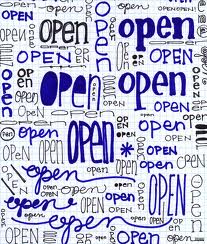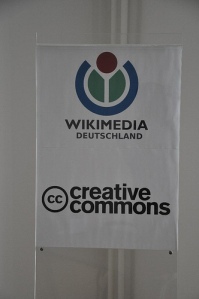EDU 520: OERs and Open Education
Open Education refers to the free and open sharing of educational resources to everyone around the globe. These resources can be reused, copied, or modified because of open licenses. It can include educational networks, teaching and learning materials, textbooks, data, or numerous other things. As the OpenCourseware Consortium’s website states, “Open Education gives people access to knowledge, provides platforms for sharing, enables innovation, and connects communities of learners and educators around the world” (2014).
Promising Aspects of the Movement:
There are so many positive things about the Open Education movement. Professor Michael McNally (2012) of The University of Western Ontario, mentions the following positive things that creating OERs can offer:
- Can enhance one’s scholarly reputation
- Encourages collaboration and innovation
- Allows an institution greater visibility and can help with recruitment
- Allows for free exchange of knowledge
- It’s free, easily available, and saves time
- Expands access of educational materials to non-traditional students
Downsides of the Movement:
- Costs of developing and sustaining the OER initiatives
- Lack of institutional support
- Fear of loss over one’s intellectual work
- Fear of criticism from peers or broader community
- Concerns of the quality of the content
Personal Views of the Movement:
The most exciting and promising aspect of this movement for me would be the fact that this material is open to everyone (there are no geographic barriers to knowledge) and by sharing this information and knowledge, people’s creativity can be inspired by collaborating together to construct something greater than themselves. For example, let’s say someone starts with a syllabus or outline, and modifies it, then posts that, and someone else does the same thing. That syllabus/outline now becomes the best it can be, because it has been observed and looked at by educators all over the globe! Then, any teacher can use that syllabus in their course. The same can be said for a video, lecture, or textbook. Communities of educators can spring up to discuss this syllabus that accompanies a course and they all discuss what they think about it, and how to tailor it to make it sound better or be written more along the lines of what a teacher wants it to say according to curriculum requirements. And it doesn’t stop. The process can keep on going because participants want to keep participating. As author Curtis Bonk (2009) contends, “…meaningful projects can be undertaken without traditional hierarchical, command-and-control structures, or financial compensation; there is caring and generative human spirit at work” (p. 152).
The second thing that makes me most excited about this movement is that non-traditional learners can take advantage of these resources, and be able to use them to their benefit. Maybe they want to study something for fun. Maybe they’re thinking about going to college, and want to study a course before they go. Maybe they can’t attend college in person, but accessing these online materials would be able to allow them to gain knowledge they otherwise would not be able to get.
The first big current challenge that I see for the Open Education movement would be the copyright and licensing issues that take place over material posted online. Thank gosh for Creative Commons’ – a “nonprofit organization devoted not just to expanding access to online materials, but also to the creative use and remixing of them” (Bonk, p. 157). Although this organization is in existence, there are still a lot of issues with copyright and licensing issues at hand that need to be worked out. The second challenge I see is that MOOCs (Massive Open Online Courses), and the use of these other online educational materials, will become more popular and I forsee students wanting to gain some sort of academic credit for participating in these courses. It can be difficult for universities and academic committees to all come to some sort of consensus over how to grant students actual credits or diplomas for these. Bonk (2009) asserts, “this content is typically not credentialed and often is simply lecture material or associated content to review. As such, it is what I call Level One Knowledge – basic facts. Though not graded, it brings one to a base of learning that is often needed to survive in higher education” (p. 178). I’m not sure I fully agree with that statement, since MIT puts full courses online- with video lectures, quizzes, and exams for the whole course, but I can see the author’s point here. Some work needs to be done before universities can start granting diplomas or credits.
I have learned quite a bit about Open Education and OERs that are “free”. I use that word loosely, since all things shared online may not be “free” to all just yet. Licenses and copyright issues are still being worked out in the midst of all of this sharing and collaborating. I think the sky is the limit with Open Education and it’s a really exciting time to be a learner online right now!
QUESTION:
Do you think universities offering MOOCs will ever offer “legitimate” online degrees for online learners? If so, when?
USEFUL LINKS:
MIT Open Courseware — http://ocw.mit.edu/index.htm
Udacity — https://www.udacity.com/
edX — https://www.edx.org/
Tufts Open Courseware — http://ocw.tufts.edu/
Ning — http://www.ning.com/
Drupal — https://drupal.org/
REFERENCES:
Bonk, C. (2009). The world is open: How web technology is revolutionizing education. San Francisco, CA: Jossey-Bass.
McNally, M. 2012. (2012, March). Democratizing access to knowledge: Find out what open educational resources (OER) have to offer [Video]. Retrieved from http://www.youtube.com/watch?v=W2IPOgl0ZE8
OpenCourseware Consortium. (2014, February). About the OCW consortium. Retrieved from http://www.ocwconsortium.org/about-ocw/
Posted on February 20, 2014, in Uncategorized. Bookmark the permalink. 2 Comments.



I have my doubts about MOOCs becoming legitimate. I believe that there will have to educational standards established with oversight from the educational community to monitory and regulate contributions and content.
I think they will eventually be offered for degrees. It will require some oversight but overtime I honestly do believe they will be adopted. Though I don’t have supporting data, I would guess there was similar skepticism about online classes and complete online degrees when they started to be formed.